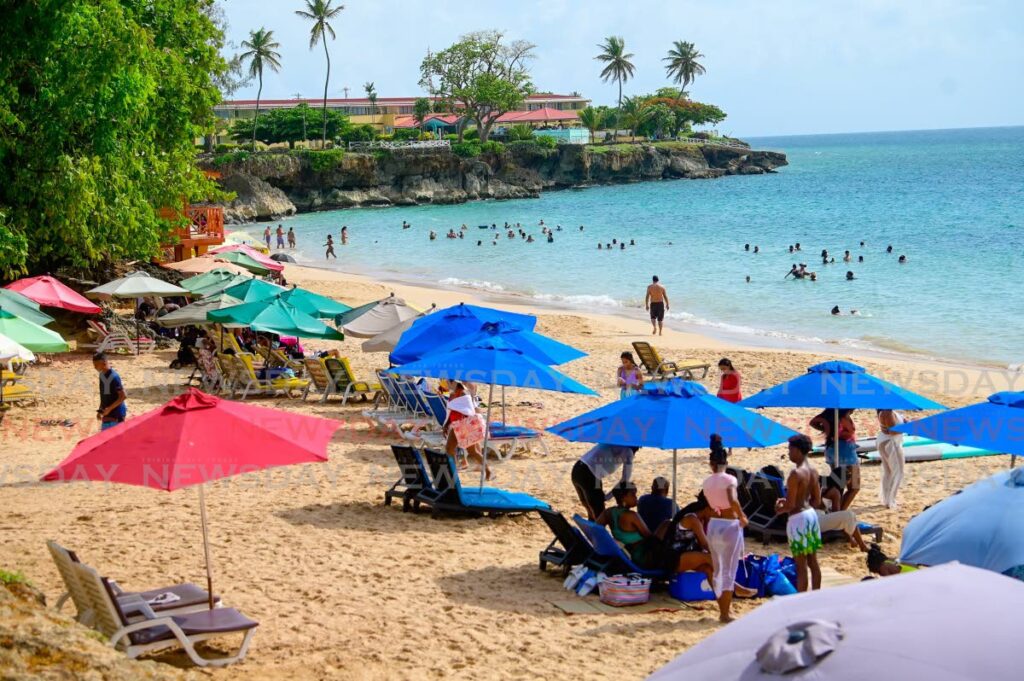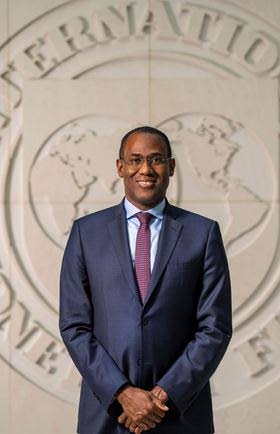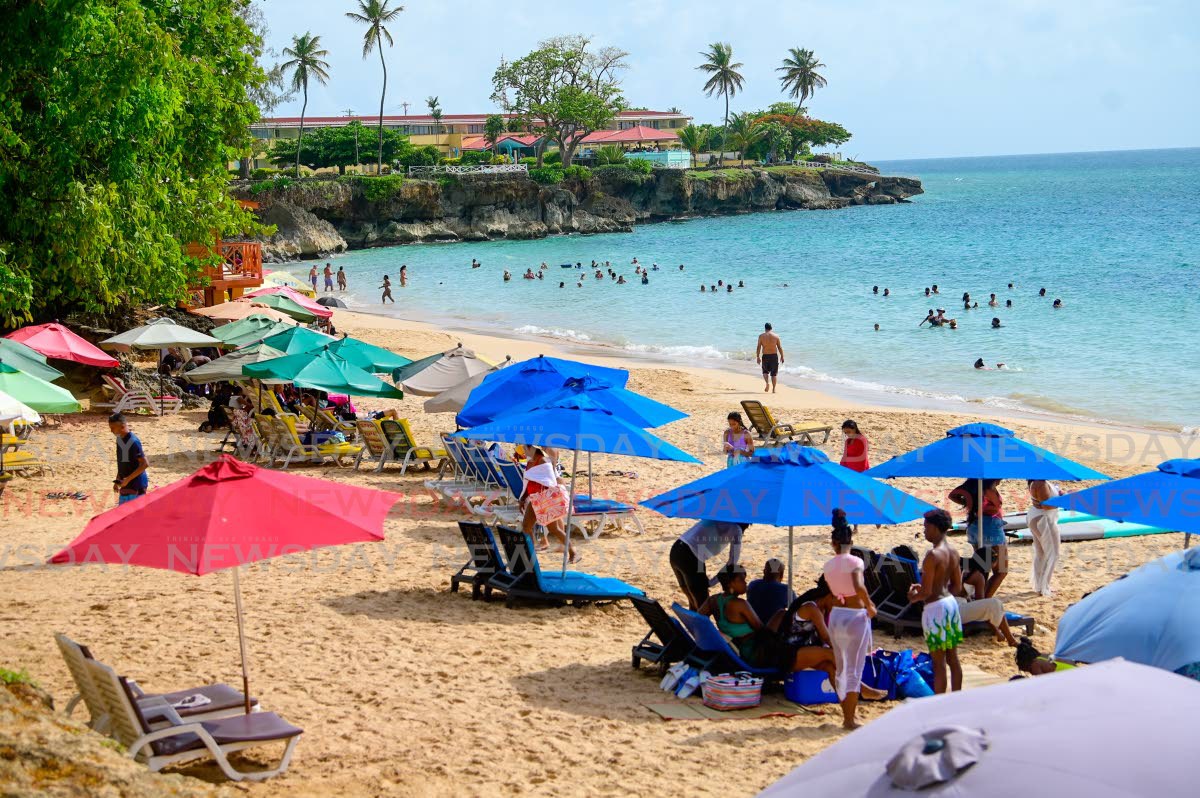7 Hrs Ago
 In this 2024 file photo, tourists and visitors flock to Store Bay, Tobago. IMF deputy managing director Dr Nigel Clarke says Caribbean electricity prices are among the highest in the world, undermining tourism and manufacturing competitiveness. – Visual Styles
In this 2024 file photo, tourists and visitors flock to Store Bay, Tobago. IMF deputy managing director Dr Nigel Clarke says Caribbean electricity prices are among the highest in the world, undermining tourism and manufacturing competitiveness. – Visual Styles
THE CARIBBEAN’S economic growth potential has declined by half over the past two decades, heightening the region’s vulnerability to global shocks and widening its income gap with advanced economies.
Productivity, the principal driver of long-term growth, has flatlined, undermining efforts to improve living standards and stalling progress toward economic convergence.
That was the stark assessment delivered by Jamaican Dr Nigel Clarke, the International Monetary Fund’s (IMF) deputy managing director, during the 25th William G Demas Memorial Lecture in Brasília on June 10.
At the Caribbean Development Bank’s (CDB) 55th annual meeting in Brazil’s capital, Clarke cautioned that, without decisive policy action, Caribbean countries risk falling further into economic marginalisation.
“The consequence is that convergence in income levels between the Caribbean and advanced economies has stalled. In other words, the gap is growing wider,” he said.
Clarke’s lecture, The Caribbean Challenge: Fostering Growth and Resilience Amidst Global Uncertainty, examined how regional economic underperformance, combined with a deteriorating global outlook, threatens to leave Caribbean economies further behind unless urgent reforms are implemented.
He began by detailing the international backdrop. He pointed to a series of global shocks – from the covid19 pandemic to supply chain disruptions and geopolitical conflicts – that have reset global economic expectations.
In its April World Economic Outlook, the IMF revised its global growth forecast to 2.8 per cent for 2025 and 3 per cent for 2026, the weakest medium-term outlook in nearly two decades outside pandemic conditions. Clarke explained that renewed trade protectionism, particularly tariff hikes in the United States, has further dampened prospects for open, export-dependent economies like those in the Caribbean.
“In April, the effective US tariff rate jumped to levels not seen in a century,” Clarke said. “Trade policy uncertainty remains off the charts, and the longer it persists, the larger the costs — particularly for small economies with limited fiscal buffers.”
Yet Clarke was unequivocal that the region’s most serious challenge is homegrown.
IMF research shows average potential growth in the Caribbean dropped from just over three per cent between 1981 and 2000 to 1.2 per cent in the 2001-2019 period.
 Dr Nigel Clarke, deputy managing director of the International Monetary Fund. Source: imf.org –
Dr Nigel Clarke, deputy managing director of the International Monetary Fund. Source: imf.org –
Productivity growth – the most important contributor to long-run economic gains – has essentially stalled.
“There’s no mystery to the growth problem,” said Clarke.
“All elements contributing to potential growth have declined, but productivity has suffered the most.”
The implications are severe. Lower productivity erodes competitiveness, stifles innovation, discourages investment and limits employment opportunities, compounding social inequalities.
“Going up the down escalator – that is the challenge,” Clarke said.
“The Caribbean must reverse declining growth trends at a time when global growth itself is falling.”
The IMF official stressed that any effort to boost growth must begin with macroeconomic stability.
Citing Jamaica’s economic reforms over the past decade, Clarke argued that stability remains a precondition for sustainable growth, poverty reduction and resilience to shocks.
“Economic stability is indispensable to national success,” Clarke said. “It must be guarded and protected as a national asset.”
He credited Jamaica’s fiscal responsibility framework, debt reduction strategy and monetary reforms for enabling the country to achieve record-low unemployment and the lowest poverty rate since independence by 2023.
“Stability is also a friend to the poor,” Clarke said, noting that social programmes are far more effective when fiscal and monetary systems are sound.
“Jamaica achieved the lowest poverty rate in its 61 years of independence in 2023 again, on the back of entrenched macroeconomic stability in the context of an institutionalised social protection framework supplemented by temporary and targeted counter-cyclical measures at times of distress.”
Rebuilding buffers, preparing for disasters
Clarke warned that the Caribbean has little room for complacency. Public debt remains high in several countries, and rebuilding fiscal buffers depleted by the pandemic and multiple external shocks must be an immediate priority.
In particular, Clarke highlighted the Eastern Caribbean Currency Union (ECCU), where achieving the region’s 2035 debt target of 60 per cent of GDP will require steady and disciplined fiscal consolidation.
“Mobilise tax revenues, spend wisely and plan ahead,” he advised.
He also endorsed expanding financial resilience to natural disasters, noting that annual damage costs average two per cent of GDP regionally and four per cent in the ECCU.
Clarke praised initiatives like the Caribbean Catastrophe Risk Insurance Facility (CCRIF) and Jamaica’s legislated disaster fund, while urging broader risk layering through sovereign wealth funds, contingent credit lines, and catastrophe bonds.
“Shocks are a permanent feature of Caribbean economic life,” he said. “Policy must provide for the inevitability of economic shocks.”
Clarke argued the region must decisively address structural weaknesses limiting productivity and private sector competitiveness.
High business costs, inefficient tax and regulatory systems, limited access to finance, weak human capital development and poor infrastructure have stifled firm-level productivity and deterred investment.
“Our analysis shows that overcoming these constraints could lift productivity by between 34 and 65 per cent,” Clarke noted. “That would significantly narrow the income gap with the United States.”
He was especially critical of bureaucratic inefficiencies that burden small businesses.
“Anybody who’s tried to start or expand a business in the Caribbean can testify to the complexity and delays in licensing, permitting and tax processes.”
Energy costs and the growth drag
The region’s dependence on imported fossil fuels was another major concern. Clarke noted that Caribbean electricity prices are among the highest in the world, undermining tourism and manufacturing competitiveness.
“Electricity costs in many Caribbean countries are at least twice those of advanced economies,” he said. “This fundamentally undermines competition.”
He argued that while transitioning to renewable energy can lower costs and improve resilience, such projects require stable macroeconomic conditions to be financially viable.
Clarke also suggested reforms to deepen access to finance, particularly for small and medium-sized enterprises.
He called for modernised insolvency regimes, strengthened credit registries, and the establishment of regional credit bureaus.
“Finance is the oxygen of business,” Clarke said. “Without affordable, widespread access, we cannot expect to nurture a dynamic business environment.”
He endorsed digitalisation as a productivity multiplier, pointing to Brazil’s Pix and India’s Unified Payments Interface as successful models for instant, low-cost digital payments and financial inclusion.
Expanding female labour force participation was another priority. Clarke cited IMF estimates that eliminating the ECCU’s 11-percentage point gender employment gap could raise regional GDP by approximately 10 percentage points.
Clarke highlighted persistent weaknesses in transportation, water supply, broadband access and digital infrastructure as growth obstacles. He argued that governments, constrained by fiscal limits, must pursue well-structured public-private partnerships (PPPs) to finance these investments.
However, he warned against incremental project development.
“Sequential development of PPPs will take too long,” Clarke said. “A programmatic approach, bringing a pipeline of projects to market in parallel, is essential.”
Clarke reaffirmed the IMF’s commitment to the Caribbean, both through financial support and technical advice. He encouraged governments to use IMF country reports and policy recommendations as tools for public debate and policy design.
“The IMF is an incredibly powerful resource that belongs to you,” Clarke told policymakers. “We work for you.”
He concluded with a call for pragmatic ambition, saying, “These are not easy times, and these are not easy steps to take,” Clarke said. “But they require vision, coordination, partnerships, technical expertise and the resolve to act.”
Clarke presented ahead of the CDB’s discussions this week, which will focus on project financing, disaster risk management and strategic investment partnerships.
The annual William G Demas Memorial Lecture honours the late TT economist, former Central Bank governor (1988-1992) and CDB president, William Demas, a leading advocate of Caribbean economic integration and policy leadership.
The 2025 lecture, held in Brasília for the first time, marked the opening of the CDB’s 55th annual meeting under new president Daniel Best.
